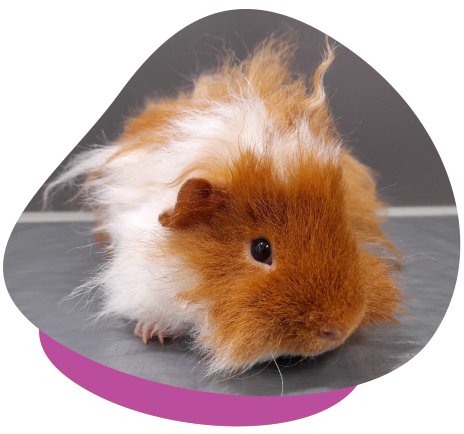Guinea pigs make great pets. They are an intelligent species, with each guinea pig having its own unique personality, often bonding well with its owner.
They are relatively easy to care for. However, there is some important information about feeding, husbandry and veterinary care that all guinea pig owners should know and understand. This care sheet will highlight these important points and share some handy tips about keeping your guinea pig happy and healthy.
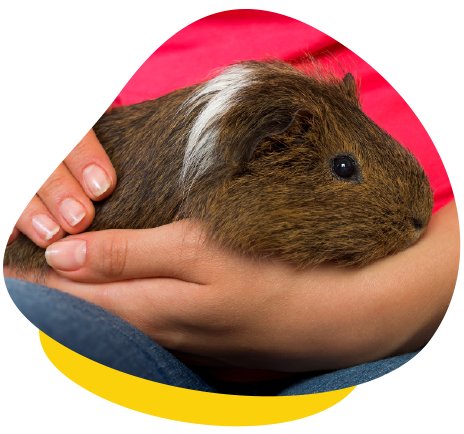
Basic and Interesting Information
The guinea pig (Cavia porcellus), also known as a ‘Cavy’, is a member of the rodent family Caviidae. They generally live for an average of 6-7 years, however some can live longer, and we have seen some guinea pigs that have been eleven years of age! There are many different coat types and colour variations available in Australia.
An unusual thing about guinea pigs is that they have a different number of toes on their front feet compared to their back feet, with four toes on the front and only three on the back.
A normal but somewhat unpleasant activity that guinea pigs partake in is coprophagia. This is where they will eat their own faeces, and it’s normal behaviour for a guinea pig to do. It helps keep the good bacteria in their digestive tract healthy.
Female guinea pigs (also known as sows) have an oestrous cycle of about 15-17 days. They are generally prolific breeders and can get pregnant again immediately after giving birth. An average guinea pig litter size is between 2-4 babies and the average gestation period of a guinea pig is between 63 – 72 days: a lot longer than rabbits, rats and mice.
Unlike rabbits, and many rodents, baby guinea pigs (pups) are born fully furred with their eyes open and can walk within minutes of birth. Despite requiring their mother’s milk for at least the first three weeks of life, guinea pig pups can eat solid food within hours of birth.
Guinea pigs can start to be sexually active as early as four weeks of age, and it is recommended to wean pups from their mother at this time. If young male guinea pigs (boars) are not separated from their mother or sisters by this time, accidental and unwanted pregnancies can occur.
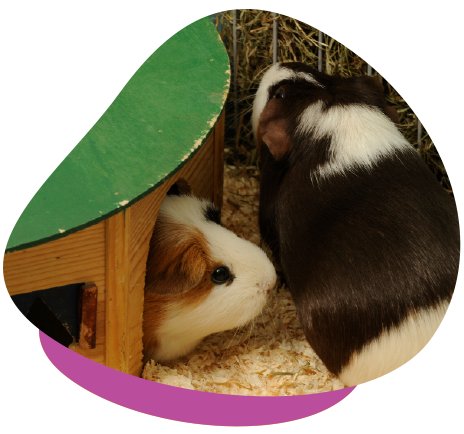
Choosing a Healthy Guinea Pig
There are many different places where you can purchase or adopt your guinea pig. Regardless of where you choose to get your guinea pig from, it would be best if you gave them a thorough examination before purchasing.
Guinea pigs should have a healthy gleaming coat with no patches of missing fur, clear and bright eyes, pink and moist gums, nice clean and even teeth, clean feet without sores, and an active and curious disposition. They should also have well-formed faeces. It can require some skill to correctly identify the sex of a young guinea pig; therefore, we recommend buying from someone who has experience in determining the sex of young guinea pigs.
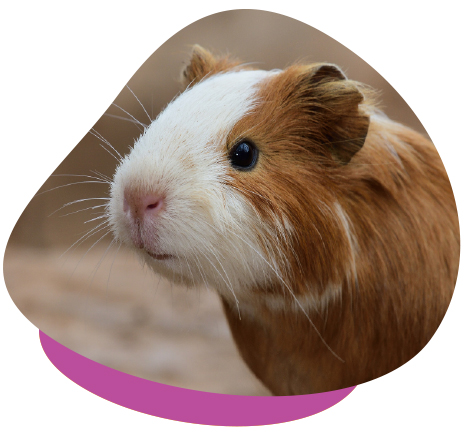
General Keeping Recommendations
Guinea pigs are considered herd animals, and they enjoy the company of other guinea pigs. There is little difference between boars and sows as pets.
However, it is important to keep in mind that two adult boars who are unfamiliar with each other will tend to fight one another if introduced suddenly. When introducing two boars together for the first time, it is best to introduce either two young boars or a young boar with an older boar. Alternately, castration of both boars will usually help stop boars from fighting.
Husbandry and Housing
Good husbandry is essential with guinea pigs, with many diseases being preventable with adequate care. Guinea pigs do well in a large hutch that is either inside or undercover and free from direct sunlight, rain and windy drafts. It is recommended that each guinea pig be provided with a minimum floor space of approximately 100x150cm; however, the more room, the better.
Newspaper can be used to line the bottom of the hutch with a bedding substrate such as oaten or meadow hay or recycled paper kitty litter placed on top. The bedding should be changed regularly to avoid the cage becoming too dirty or smelly.
Ammonia is produced in guinea pig urine, and guinea pigs are sensitive to high ammonia levels in the air. Keeping the hutch clean and tidy helps keep ammonia levels down and avoid potential problems. Waste from the hutch makes for great mulch and compost for your garden.
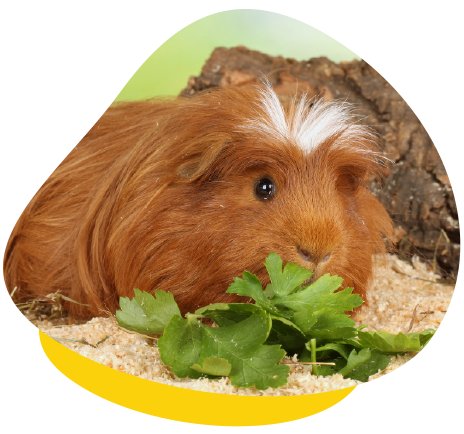
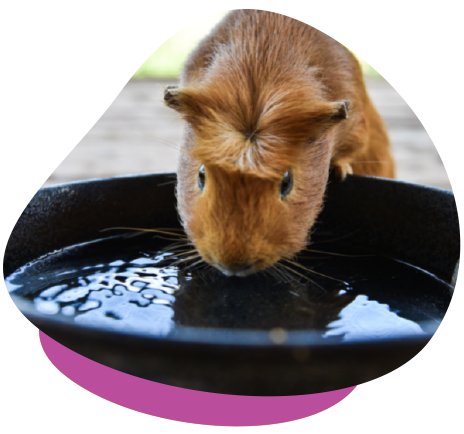
Cage Accessories and Enrichment
Guinea pigs love hidey holes, so enrichment can be provided by placing things such as hide away castles, plastic tunnels/pipes, cardboard houses and hay nests in your guinea pig’s hutch. Enrichment can also be provided in the form of toys and may provide hours of entertainment for your guinea pig each day.
Temperature Control
Guinea pigs are sensitive to heat and may experience heat exhaustion when temperatures are more than 26°C or if they are forced to be in direct sunlight. In some cases, heat exhaustion can be very severe and lead to death. It is vital to keep your pet guinea pig cool on hot days, especially if they are living outside the house.
Ensure they have access to plenty of water, fruit and vegetables on hot days and ensure that the hutch has plenty of cool shady areas available throughout the day. Frozen water bottles can be provided as a cold object for your guinea pig to lay against on a hot day.
What to feed my Guinea Pig?
Guinea pigs require a diet high in fibre and protein, with some fats, carbohydrates, vitamins and minerals. Fibre is a critical part of a guinea pig’s diet. Diets lacking fibre have been associated with gastrointestinal and dental diseases.
Guinea pigs cannot produce and store Vitamin C (ascorbic acid) in their body; hence Vitamin C is a dietary essential for a guinea pig and must be provided in the daily diet. Deficiencies of vitamin C can lead to a range of serious diseases.
It is important to provide a diet for your pet guinea pig high in protein, fibre and vitamin C. This can be achieved by providing plenty of good quality oaten or timothy hay, a small amount of a quality pellets, as well as daily vegetables and fruits. Too much fruit in the diet can lead to gastrointestinal issues, and we recommend using fruits as treats only.
Vegetables that are safe to feed and that contain high levels of Vitamin C include leafy green lettuce (not iceberg), parsley, broccoli (stem and flower), kale, Asian greens, capsicum, spinach and mint.
Guinea pigs love fresh grass, which is great for their digestive and dental health. Providing time on the lawn either in a secure cage or whilst being supervised is a great way to provide grass to your pet.
Clean, fresh water should be on offer at all times. This can be provided easily with a drinker bottle attached to the cage; however, many guinea pigs do prefer a bowl.
Foods To Avoid
Iceberg lettuce and potato should be avoided as they may cause diarrhoea in your guinea pig.
What do I need to take my Guinea Pig to the Vet for?
Guinea pigs require regular veterinary care and health checks. The following is a summary of what we recommend.
Regular Health Checks
We recommend health checks for guinea pigs every 6 to 12 months. At this time, your guinea pig will receive a thorough examination to help identify any occurring problems. Your guinea pig’s teeth will also be checked, and advice on the prevention of dental disease can be discussed.
There are no vaccinations available for guinea pigs in Australia; therefore, guinea pigs do not require annual vaccinations.
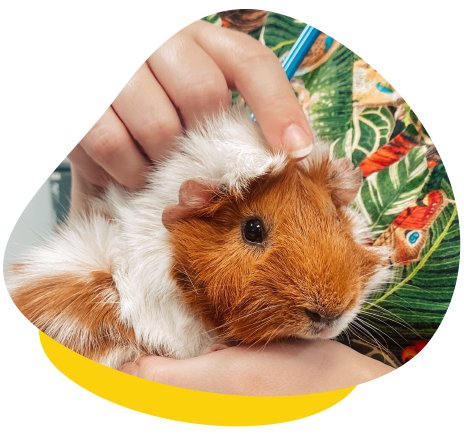
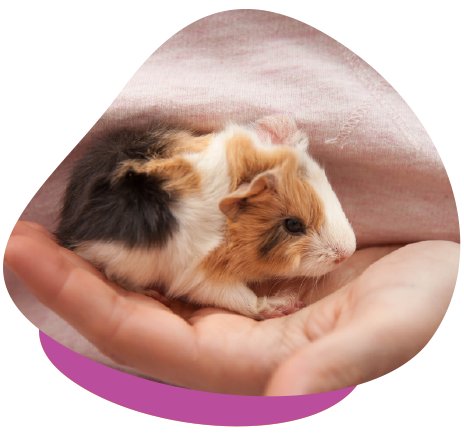
Sterilisation
- Neutering your guinea pig can be beneficial for the following reasons:
- Reducing the risk of fights occurring if you have more than one guinea pig
- Decreasing aggression between boars
- Prevents unwanted pregnancies
- It prevents the development of ovarian cysts in females, which is a common reproductive disease in female guinea pigs.
- Reducing the risk of male guinea pigs developing faecal impaction (which often requires the build-up of faeces around their anus to be cleaned by their owner daily).
- We recommend sterilising all guinea pigs generally from 3-4 months of age.
Signs Your Guinea Pig Is Unwell
Even with the best care, problems can still occur. Things to watch out for include but are not limited to the following:
- Lethargy
- Diarrhoea
- Weak hind legs
- Hair loss
- Not eating or not drinking
- Dull eye colour or coat
- Squealing when urinating
- Dirty teeth
- Scratching excessively
- Water staining around the mouth
- Weight loss
- Discharge from eyes and/or nostrils
- Lump formation
By following the above advice, you can help reduce the chances of common problems occurring and ensure that your guinea pig receives the care it deserves.
If you have any concerns about your guinea pig’s health or you wish to make an appointment with us, please visit our website to book online.
